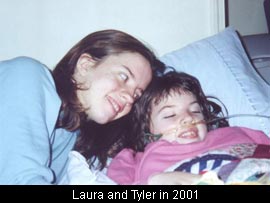Laura: She understood when you talked to her. She loved books, she loved to watch movies. She was very, very happy for someone who was very sick. I knew when I was younger that Tyler was going to die. They told us that she would probably live to be ten, and she lived to be twelve. I knew that it was final. I knew that she wasn’t going to come back. I remember my parents trying to explain it to me in little kid terms. They said, “Tyler’s sick, she’s going to die, she’s not going to be with us anymore, she’s going leave…” It was never really fully explained to me as, like, medical terms.
Because Tyler's condition kept getting bad, then a little better, then bad again, Laura's grief felt like a wound that kept closing and opening.
Laura: You woke up every morning and you weren’t really sure if today was going to be the day. I remember waking up in the middle of the night and having to go to the emergency room and spend the night asleep in the waiting room and just thinking, this is it, my sister’s going to die. And then, we’d take her home a week later. And I’d be like, “Okay, I dealt with it, I dealt with my grief that night, and okay, let’s do it all over again.” It happened monthly.

Then, it finally happened. Laura was out to lunch with some friends when her Dad called with the news that Tyler had died. Because Tyler was at the edge of death for so long, Laura had already said goodbye to her sister while Tyler was still alive.
Laura: Three nights before she died, I had all of my girlfriends that I consider to be close to me come over and spend the night. We all went in Tyler’s room, we kicked everybody out, all the nurses, all the hospice care workers, everybody, and we said, “This is our time.” We brought the CD player in, and we put every sappy love song in and every song that ever makes you cry on the radio, and we sang to her all night long. And that night she went into a coma, and three days later she died. My mom tells me that I crawled into bed with her and said goodbye, but I really don’t remember that at all.
Laura and her family were very sad after Tyler finally died, but mixed with their sadness was some sense of relief that Tyler’s long fight was over.
Laura: She wasn’t struggling anymore. She wasn’t in pain anymore. She was finally where she needed to be…and WE weren’t struggling anymore. It’s a lot quieter here now that Tyler is gone. There are no oxygen machines and feeding machines. The house is just quiet and calm.
To express and work through her feelings about Tyler’s illness and death, Laura has talked to therapists and to other kids in support groups. She also has creative ways to get her emotions out.
Laura: My therapist, you get the security with her. The confidentiality thing comes into big play. You just go in there, and for an hour you just spill. You just let it all out, and there’s this person there that just listens, and they don’t judge you. I have a journal that I would write in every night. I still do. You go there and you pour everything out. I also sing in choir twice a day.
Shortly after Tyler died, Laura started to go to Camp Comfort Zone, where she met kids her age who were also dealing with the grief of losing a loved one. At first, she didn’t want to go.
Laura: I don’t know one person who has gone to Comfort Zone who has wanted to go their first time. I had to be bribed to go! But you get there, and you don’t want to leave. In this 48-hour period, you’ve made best friends that last a lifetime, because these people all know what you’re going through. They’ve all felt these feelings before. That’s not something you get everywhere you go. Every camper gets a “big buddy” so it’s one on one. My big buddy’s name was Ellen, and she was so nice. I loved her, and she made me feel so at home.
Today, Laura’s life is as normal as she could hope for. She remembers Tyler’s life and death, but she’s focused on the future, which includes such things as taking the SAT and preparing for college. She’s also dedicated to helping younger kids who are going through what she went through, and volunteers as a counselor at grief camps like Comfort Zone.
For more information about Camp Comfort Zone, visit www.comfortzonecamp.org or call (866) 488-5679.
Previous



